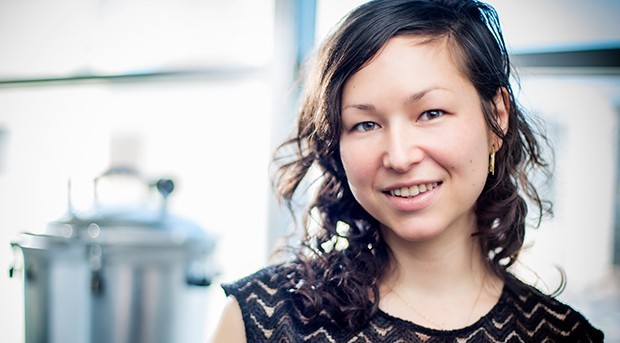Concordian Maya Hey challenges our notions of edibility
 Maya Hey: "How we relate to microbes is complicated because we cannot see them."
Maya Hey: "How we relate to microbes is complicated because we cannot see them."
Most people don’t take the phrase “you are what you eat” literally. But for one Concordia scholar, it’s actually a key part of her research.
“I study fermented foods to look at the relationships between humans and microbes,” explains Maya Hey, a communication studies PhD student in the Faculty of Arts and Science.
“Microbes are omnipresent. They live inside, on and around us. How we relate to them is complicated because we cannot see them. At the same time, we are made up of microbes. If we are what we eat, what exactly do we become when we eat fermented foods?”
As a communications scholar, Hey studies food as a medium.
“In the same way that film or other media scholars look at the relationship between the material and its meaning, I examine the interactions between food-as-form and food-as-force,” she says.
“Research-creation allows me to acknowledge its materiality. There’s only so much we can talk about food before we run into the limitations of text. After all, the menu is not the meal.”
'What goes into our notion of edibility?'
Hey’s research strives to make the invisible visible, food-wise. This has led her to approach “handmade food” in a whole new way.
“I recently produced ‘handmade cheese’ that used the bacteria living on my hands,” she says.
“Rather than remain in the conceptual realm of how we relate to microbes, this cheese in physical form allows people to react. It asks questions about what goes into our notion of edibility, what constitutes contamination or how we decide to eat other living beings.”
In addition to the culinary arts, Hey’s work involves a mix of theories from communication studies, feminist scholars and Science and Technology Studies (STS). “My work traverses the arts and sciences.”
She admits the interdisciplinary nature of her work can be challenging at times, because the arts and sciences do not speak the same language. “Interdisciplinarity also means being mindful of terminology so that I don’t alienate my audience,” she says.
“With the mishmash of arts, science and feminism, I often joke that I wear a chef’s coat, a lab coat and a white pantsuit!”
What’s next?
Hey is currently working on two projects that continue her “handmade cheese” research.
“I am prototyping other foods that complicate our ideas about microbes, including a bread inoculated with yeasts isolated from my cheekbone (tentatively named ‘bisous bread’) as well as a gelée dessert that contains microbes genetically modified with glow-in-the-dark proteins. Stay tuned!”
Hey hopes her work will continue to provoke thought and discussion about how we chow down.
“When considering food, I want people to shed the rhetoric of human-centred thinking and, without dismissing pleasure, find alternate ways of being mindful of who or what we eat.”
Hey will be hosting an introductory, hands-on workshop that examines microbes in fermented foods marketed as probiotic. The workshop will be held over two days (on May 14 and May 18) as part of Concordia’s Science Odyssey activities. Learn more about “What’s REALLY in Your Yoghurt?”


